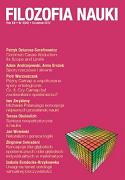Spory rzeczowe i słowne
Substantial and Verbal Disputes
Author(s): Adam Andrzejewski, Anna BrożekSubject(s): Philosophy
Published by: Uniwersytet Warszawski - Wydział Filozofii i Socjologii, Instytut Filozofii
Keywords: endurantism; perdurantism; metaontology; conceptual analysis; intuitions; disputes
Summary/Abstract: The main subject of the paper is to present the criteria which help us to establish whether a given ontological controversy (or even a whole dispute) is substantial or merely verbal. We argue that there exist certain methodological tools which enable us to establish whether particular ontological disagreement is substantial or merely verbal. However, as we emphasize, the scope of application of these tools is limited to strictly defined cases. At first, we clarify the general background for an occurrence of ontological controversy. Assume that a controversy occurs between A and B iff: (a) A uses language LA, and B uses language LB; (b) in both languages there is a sentence ‘S’ (c) A accepts the sentence ‘S’ and B rejects the sentence ‘S’ (d) A aims at making B accept the sentence ‘S’ and B aims at making A reject the sentence ‘S’. Having defined the above, we formulate and justify following definitions: [SUBSTANTIAL CONTROVERSY] Suppose the conditions (a)-(d) occurred. If the controversy between A and B is substantial, then: there are two different sentences S1 and S2 of the language L, such that a translation of S from the language LA into L is S1 and the translation S from LB into L is S2. [VERBAL CONTROVERSY] Suppose the conditions (a)-(d) occurred. If the controversy between A and B is verbal, then: there is a sentence S3 of the language L that both the translation of S from the language LA as well as the translation of S from the language LB into L is S3. [SEEMINGLY SUBSTANTIAL CONTROVERSY] Suppose the conditions (a)-(d) occurred. A controversy between A and B is seemingly substantial when A and B are sure that the controversy between them is substantial but it is merely verbal. In the above definitions, the concept of language L occurs. We assume that it is a quasi-universal language to which every sentence of LA and every sentence of LB may be translated. We focus on how to recognize the language L, scil., how to establish the rules of translation of an ontological term of LA to another ontological term in LB. The proposed idea is that such a quasi-universal language L may be (re-)constructed only if A and B share the same pragmatic and/or cognitive attitudes. Then, it is highlighted how the presented conception of types of ontological controversies may be applied to the analysis of some ontological controversies, in particular, the debate between endurantism and perdurantism. The goal is achieved in two steps. Firstly, we use the required presuppositions of the language L in order to compare endurantism and perdurantism. Then, the following ontological concepts from these ontologies are discussed: „a thing of a common experience”, „part” and „ontological sum”. In consequence of the analysis, the serious affinity between endurantism and perdurantism is revealed. That is, the main differences between those ontologies are revealed as merely verbal.
Journal: Filozofia Nauki
- Issue Year: 20/2012
- Issue No: 4 (80)
- Page Range: 31-44
- Page Count: 14
- Language: Polish

